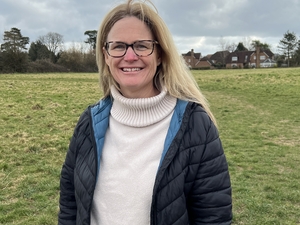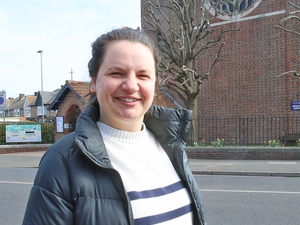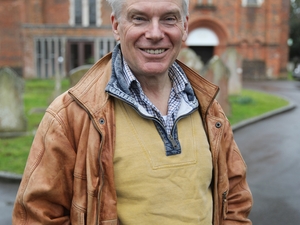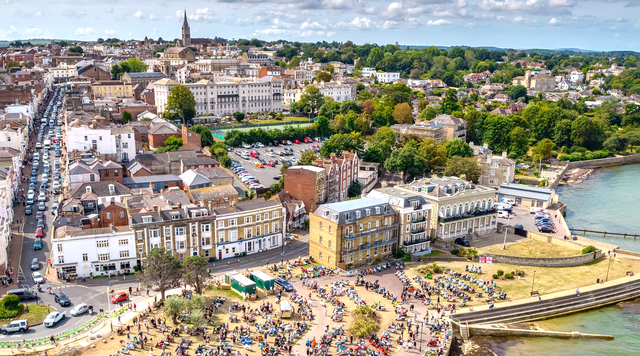-

23 April 2025
New minister will unveil ‘Barn Church’ this autumn
Bishop Jonathan has appointed the Rev Emma Andersen to a new role within the Meon ... read more
-

24 March 2025
Harbour stalwart to lead Copnor congregations
Bishop Jonathan has appointed the Rev Katherine Message to be a new team vicar for ... read more
-

24 February 2025
Project aims to plant two generations of church
An ambitious project aims to plant a church in Fareham – that then plants a ... read more
Funding boost to develop island churches

CHURCH of England parishes in the Isle of Wight have been given extra funding in a broad initiative to support and develop their congregations.
A five-year, £2.7m project aims to plant a new congregation in Ryde (pictured above), whilst equipping existing ones to have more engagement with schools and explore new ways to serve the local community.
The national Church of England has announced that it will invest more than £1.2m of its strategic funds in the project. The other £1.5m would come from the Diocese of Portsmouth to fund clergy positions.
This is the first part of a larger drive to encourage churches across the whole diocese, with significant investment in lay and ordained ministry in 2024, which we hope will be supported by further national Church funding.
This initial project aims for All Saints Church, Ryde, to grow from its current faithful congregations to include up to 300 new worshippers attending different styles of church service. This would include a new family worship service planted with the help of Harbour Church, Portsmouth, plus a Café Church, traditional Eucharistic worship, and an intern scheme for young people.
The five C of E churches in Ryde – All Saints, St John’s and St Michael’s in Ryde itself, plus St Peter’s, Havenstreet and Holy Cross, Binstead – would work together to engage with the seven schools across the town. They’d also work with community partners and churches of other denominations to serve the local area better.
This would be the first stage of plans to revitalise Church of England churches across the Isle of Wight. Within the five years of this project, it is hoped that All Saints, Ryde, would be able to transfer worshippers to other C of E congregations on the island, to complement worship and mission initiatives happening elsewhere.
The Archdeacon of the Isle of Wight, the Ven Steve Daughtery, said: “The island has a lot of churches – one for every 2,700 people – and many of them have small, faithful congregations. Ryde has the island’s largest population, and church attendance there represents less than one per cent of its residents. It’s also the gateway to the island, so it seems a good place to examine fresh ways of doing church, alongside what already exists.
“There are about 30 island Christians who meet in each other’s homes, some of whom travel to the mainland to Harbour Church in Portsmouth. So there is already a group who are able and committed to starting something new.
“Harbour Church was launched in 2016 with 15 people and now attracts 500, mostly teenagers, students and young adults. It has already planted three churches on the mainland, so it makes perfect sense for these 30 or so islanders to plant a similar congregation in Ryde, with the help of Harbour Church. All Saints Church is a landmark and is in good repair, so we’d like our new family congregation and Café Church to be based there.
“Within two or three years, we’d expect that the various All Saints congregations would have grown into a younger, more diverse group, including families, younger adults and children, as has happened on the mainland. We would then invite some of them to move from Ryde to join in with what is already happening in Newport.
“While this is happening, we want to ensure that traditional worship continues and flourishes alongside newer services, which is why we have already appointed a team vicar for the five Ryde churches.
“We are delighted that plans for the revitalisation of the parishes in Ryde have received support. We long to play our part, alongside our brothers and sisters in other parts of the Christian community, in witnessing to the gospel of God’s Kingdom in Jesus Christ.”
Some of the £2.7m funding will be spent on providing the four clergy for the five Ryde churches – a team rector, two team vicars and one curate. The team vicar who will take charge of traditional, inherited worship, the Rev David Morgan, was appointed in September and other appointments will follow.
The national Church’s funding also allows for other staff to be recruited – a chief operational officer, worship/youth leader, children/families leader, part-time administrator and four interns. Some of the funding will also be spent on work to church buildings, so they can be used for a variety of worship styles and community activities.
The project also fits in with the diocese’s vision and strategy for the future, which aims for all people to be given opportunities to become disciples of Jesus via a variety of styles of worship and prayer.
This is the fourth time that churches within the Diocese of Portsmouth have been offered strategic funding by the national Church to help establish new mission initiatives.
The first such grant, in 2016, helped to launch Harbour Church in Portsmouth – aimed at students and young people – and created a network of pioneer ministers. Harbour Church has subsequently grown from 15 people to 500 with an average age of 26. They meet across three locations in the city and have planted a further three churches elsewhere.
Another grant, in 2019, helped to launch St Margaret’s Church as a church plant from St Jude’s, Southsea, in a building that was no longer being used for worship. It has grown from its initial group of 20 people to welcome 200 people of all ages each Sunday, and to engage with the local community via a café, soft play area and Pantry.
National C of E strategic funds have also been spent on mission initiatives in North Gosport, South Gosport, Newport and Carisbrooke, and St Luke’s Southsea. The national C of E has also agreed that there should be a ‘reset’ of those projects, with some of the national funding reallocated across those projects, and some adjustment of the outcomes expected.